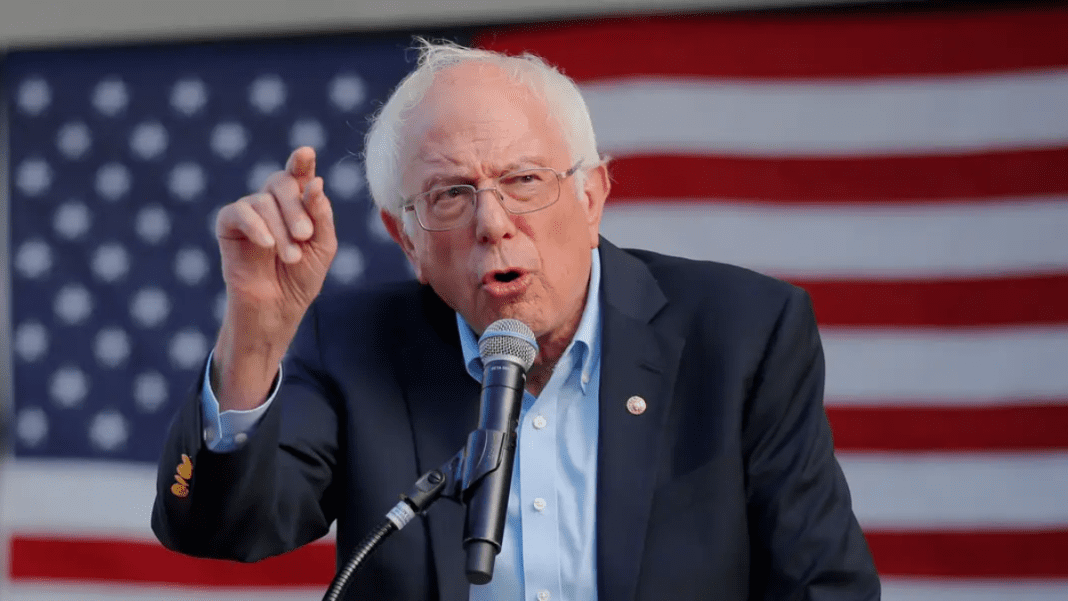Senator Bernie Sanders (I-Vt.) has strongly criticized President Donald Trump and his allies, blaming them for the record-breaking U.S. government shutdown. Sanders said the standoff is about protecting billionaires’ tax breaks while millions of Americans face higher healthcare costs.
In a video shared on social media, Sanders said the shutdown resulted from Trump’s decision to give “a trillion dollars in tax breaks” to the wealthiest Americans, including Tesla Inc. (NASDAQ: TSLA) CEO Elon Musk and Amazon.com, Inc. (NASDAQ: AMZN) founder Jeff Bezos.
Sanders said Republicans now want to pay for those tax breaks by cutting health programs for working families. He warned that millions of Americans could lose their coverage and face skyrocketing costs under the Affordable Care Act (ACA), also known as Obamacare.
“Trump and his friends gave a trillion dollars in tax breaks to the top 1%, Mr. Musk, Mr. Bezos and all these other billionaires,” Sanders said. “That is what the shutdown is about. The Democrats must not cave.”
According to Sanders, Republican policies could cause 15 million people to lose Medicaid coverage next year and double premiums for 20 million more who rely on the ACA for insurance.
Bernie Sanders blasts Jeff Bezos over Amazon’s AI automation plan that could erase 500,000 U.S. jobs
On X (formerly Twitter), he wrote: “We cannot give $1 trillion in tax breaks to the 1% and pay for that by throwing 15 million people off their health care and doubling premiums for 20 million more. That’s what the shutdown fight is all about.”
Sanders urged Democrats not to back down, saying they must protect healthcare and working families instead of giving in to pressure from Trump and the wealthy elite.
President Trump Pushes To Scrap Obamacare And Redirect Funds
On Saturday, President Trump renewed his long-standing push to abolish the Affordable Care Act. Posting on Truth Social, he proposed that funds currently paid to insurance companies should instead be sent directly to individuals, allowing them to buy their own health plans.
Trump and his supporters argue that this plan would give Americans more control and flexibility. Critics like Sanders say it would weaken healthcare protections and leave millions without coverage.
The debate over the ACA has divided Washington for years. Democrats have defended the law as essential for expanding access to affordable healthcare, while many Republicans claim it raises costs and limits choice.
Sanders said Trump’s proposal shows the administration’s misplaced priorities. Instead of addressing healthcare affordability, he said, the president is using the shutdown to push policies that benefit billionaires. He emphasized that Democrats must resist any deal that sacrifices healthcare funding or coverage protections.
Shutdown Fallout Hits The Economy And Public Services
The shutdown — now the longest in U.S. history at 40 days — has caused widespread disruption to daily life and the economy. Many federal employees remain unpaid, and key government services are struggling to operate.
Across the country, over 1,000 flights have been delayed or canceled, and food assistance programs are being interrupted. The Supplemental Nutrition Assistance Program (SNAP) has faced funding challenges, leading to long lines at food banks in major cities.
Economic experts are warning of serious consequences if the shutdown continues. Goldman Sachs economist Alec Phillips estimated that the standoff could reduce U.S. economic growth by more than one full percentage point in the fourth quarter.
Meanwhile, a new Emerson College poll showed that President Trump’s approval rating has dropped to 41%, reflecting growing public concern over the prolonged government closure.
There are small signs of progress on Capitol Hill. The Senate is expected to take a procedural vote to begin reopening the government, raising cautious hopes that the 40-day impasse may soon end.
Despite political tensions, markets remain active. According to Benzinga’s Edge Stock Rankings, Tesla continues to show strong upward momentum across short, medium, and long-term periods.
